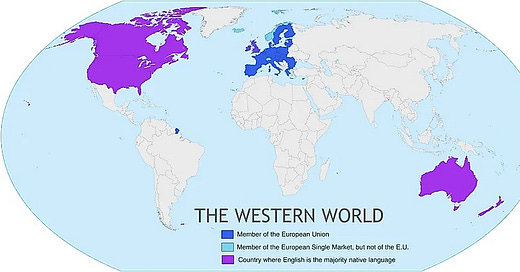On "Western Civilisation"
The prevailing narrative has for a long time been that there is a distinct "Western civilisation", that includes the historically white Christian nations of western, central, southern, and northern Europe, as well as North America, Australia, and New Zealand. This idea of "the West" as a geopolitical entity sharing common values and part of a common civilisation is widely accepted.
However, when one delves deeper into this narrative, it instantly breaks down. The similarities between the so-called "Western nations" are often superficial, and "the West" includes nations that have practically nothing in common with each other whilst excluding nations that do. Generally speaking, "the West" has come to refer to a grouping of diverse, completely distinct nations in arbitrarily defined areas.
The West is said to include much of Europe - though not all of it - and North America. But what on earth does a Catholic nation like Spain or Portugal have in common with Canada or the USA? How are these nations part of the same civilisation? Conversely, why is it that modern commentators usually include Orthodox Slavic nations like Bulgaria as part of the "West", whereas Russia and Belarus, also Orthodox Slavic nations, are excluded? Moreover, why are Italy or Poland or Belgium - three Catholic nations in Europe - considered to have more in common with the Protestant nations of North America than with the Catholic nations of Latin America, which are almost always excluded from the "West".
The answer to this question is frankly simple: because, in the eyes of the elites, the "West" is a convenient way to describe the nations that are subject to the American-imposed "democratic world order".
The fact is that there is no civilisation common to such diverse nations as France, the USA, New Zealand, Slovakia, and Norway. These nations are called "Western" though they have little in common beyond a reasonably high standard of living and liberal-democratic governments. Ethnically, religiously, and culturally many of them are much closer to non-"Western" nations than they are to each other.
Before the Reformation, the "West" was effectively the grouping of nations that professed the Holy Catholic Apostolic Faith. It could have been synonymous with "Catholic civilisation". However, since then, the term "West" has lost its meaning as a descriptive term. Yet still, it became common to refer to the European nations and the new nations their empires built as "Western" regardless of whether such nations were Catholic or Protestant. A Protestant country has little in common with a Catholic country, for example. You cannot speak of a civilisation where the countries part of it have completely different religions, cultures, and ethnicities.
This is why the term "Western civilisation" has effectively long lost its meaning. Practically speaking, there are civilisations, but a common "Western" civilisation based on some vague ideal of shared democratic values is not one of them.
I would posit that there are civilisations, some of which overlap, and are therefore not mutually exclusive, but all of which are based on some kind of shared religious or ethnic element.
For instance, there is "Catholic civilisation". This includes all the Catholic nations of the world, and everywhere where Catholics are a preponderance of the population. Thus it includes places as diverse as Poland, Peru, western Ukraine, Quebec, the Philippines, Mexico, France, etc.
There is also an Orthodox civilisation: Russia, Greece, Romania, etc.
And too there is an Islamic civilisation.
Yet there is also a Slavic civilisation: Russia, Poland, Slovakia, etc. And a Hispanic civilisation: Spain, Mexico, Argentina, etc. And an Anglo civilisation: Britain, Australia, New Zealand, etc.
From a civilisational point-of-view, a country like Poland has much more in common with Russia that it does with the Anglo world. So too does Spain have infinitely more in common with a country like Argentina than it does with Canada, or New Zealand, or the USA.
To speak of a "civilisation", at least one of these four elements must exist:
1. Common religion.
2. Common ethnicity.
3. Common language or common language grouping.
4. Geographic contiguity (this must be coupled with one of 1 - 3).
Yet the "West" fails on all four points. It is true that most "Western" nations are Christian. However, not only has the West been expanded to include, by some, non-Christian nations like Japan and South Korea, but it also excludes the vast majority of Christian nations which are in Latin America and Africa. Moreover, even amongst the old Christian nations of Europe, there are three different religions: Catholicism, Protestantism, and Orthodoxy. Catholicism and Protestantism are completely different, so much so that there is almost no religious solidarity between the Catholic and the Protestant because the Protestant does not really believe in the essence of Christianity as it is heretical.
Secondly, although most Western nations are historically white, the "West" excludes white nations like Russia and Argentina.
Thirdly, whilst all Western nations speak Indo-European languages, most nations who speak European languages are excluded from "the West" - like the Spanish and Portuguese speaking nations of Latin America and the Slavic nations of Russia and Belarus.
Fourthly, there is no geographic commonality between the nations included in "the West".
One cannot speak of a Western civilisation that includes the USA and Bulgaria where it excludes Russia and Brazil. This makes no sense whatsoever and is a completely arbitrary grouping of nations that has been imposed upon us by the ancient enemies of our faith: Protestants, Jews, and masons, in order to destroy Catholic and ethnic solidarity and thus, in so doing, to divide and conquer the nations which profess the apostolic faith of Our Lord Jesus Christ and to destroy ethnic, national, and civilisational solidarity by imposing the liberal-Protestant order on the world and claiming it comprises a unique civilisation encompassing certain European nations and their offspring in North America and Australasia.





